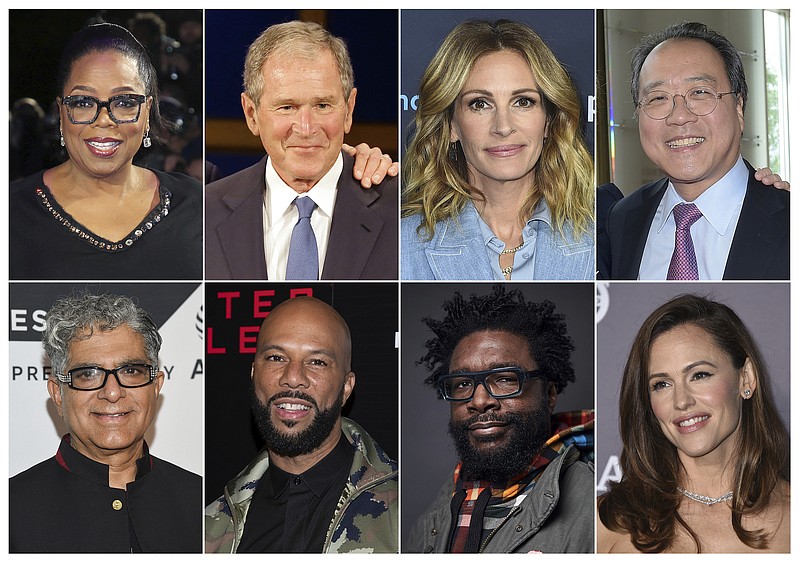Former President George W. Bush reminded us over the weekend of one of the jobs our White House leader should embrace - uniter in chief.
That we're not going to have that for the next four years, no matter who is elected, is a sad thought indeed.
Bush, who shared a brief video on Twitter as part of the "Call To Unite" 24-hour livestream event focused on the COVID-19 virus, called for Americans to "remember how small our differences are" during "a challenging and solemn time in the life of our nation and world."
Presidents have daunting jobs with tasks foreign and domestic, with the mantle of leadership of the armed forces and with the titular leadership of a particular political party. But one unwritten duty for chief executives always has been to uplift the country in difficult times, to encourage unity and to throw a proverbial arm around us and tell us everything will be all right.
Donald Trump, the current White House occupant, has made stabs at boosterism during this trying period, but they've mostly revolved around reassuring people the economy will return to a sound footing after weeks of stay-at-home orders. Indeed, we have needed a little push away from those who would have us isolated until a vaccine is perfected and after the economy has completely collapsed.
Empathy, however, is not the president's strong suit. We believe he understands Americans want to return to their jobs and the way things were only two months ago, but he is incapable of getting himself out of the way of his own words. He sometimes sounds as if he is convinced the virus has come as part of a conspiracy to ruin him.
Few and far between are words of sympathy for the families of individuals losing their loved ones, words to suggest we need to struggle together to get through the pandemic, words that praise those who are working on the front lines to save lives.
Unfortunately, Trump's assumed Democratic opponent, former Vice President Joe Biden, seems little prepared to be a uniter, either. Left for dead by his party only two months ago, he suddenly became the last candidate standing as his opponents dropped out after his expected victory in the South Carolina primary.
At times volatile and at times withdrawn on the campaign trail, he is now kept largely out of the public eye by his campaign, which is afraid he'll commit the type of gaffes of time, place and fact he's become increasingly known for. He's also weighed down by scandals involving his younger son while he was vice president under President Barack Obama and now by a sexual assault he has been accused of while in the Senate.
Although presidents since occasionally have delivered speeches with soaring rhetoric or spent compassionate moments with shooting or storm victims, Ronald Reagan was probably the last president who connected with Americans in the way we wish Trump or Biden could. Humble and genial yet forceful when he needed to be, he comforted a stunned country after the Challenger accident, stirred pride in recalling the heroics at World War II Normandy and stood fast in summits to get concessions from a then-powerful Soviet Russia.
It was with the same strength of character that Bush spoke in his weekend video, not to spite Trump, with whom he's had his differences, but to help buck up a nation weighed down by the type of enemy it has never had to deal with.
"A remorseless invisible enemy threatens the elderly and vulnerable among us," he said. "... [W]e all need to do our part. The disease also threatens broader damage [and] harm to our sense of safety, security and community."
Bush said the virus frustrates "many of the normal tools of compassion" but said we shouldn't allow "physical separation to become emotional isolation."
"This requires us to be not only compassionate but creative in our outreach," he said. Recalling the response to the Sept. 11, 2001, terror attacks while he was president, he said he had no doubt that "spirit of service and sacrifice is alive and well in America" and that "empathy and simple kindness are essential powerful tools" of recovery.
"In the final analysis," Bush said, "we're human beings equally vulnerable and equally wonderful in the sight of God. We rise or fall together. And we're determined to rise."
Trump, as only Trump can, thanked Bush for the message in a tweet but then wondered "where [Bush] was during impeachment calling for putting partisanship aside." He then added, "He was nowhere to be found in speaking up against the greatest Hoax in American history!" Trump was impeached by a partisan U.S. House in December and acquitted by the Senate in January.
Alas.
One can have their differences about Bush's two terms in office, but his brief video embodied the type of remarks Americans need to hear from their president. It's too bad a previous president had to deliver them.
